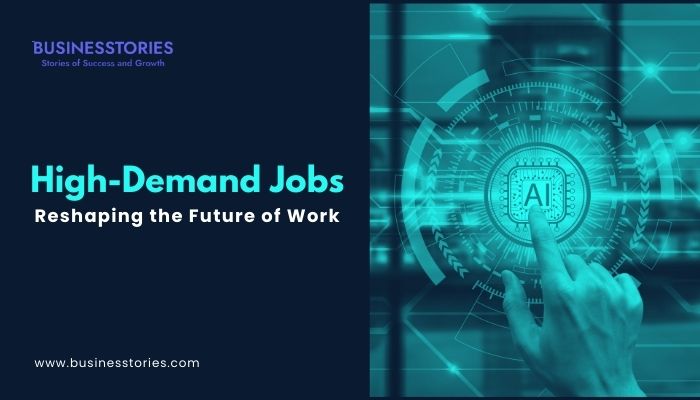The world of work is undergoing its most significant transformation in decades. According to the World Economic Forum’s Future of Jobs Report 2025, nearly 78 million new job opportunities will be created by 2030, while 170 million jobs may shift or transform. Automation, artificial intelligence (AI), and the green economy are reshaping industries at lightning speed, pushing both employers and employees to adapt. Yet, the story is not one of job loss but of job evolution—where new roles are emerging as old ones decline.
As automation takes over repetitive tasks, demand for AI literacy, sustainability expertise, and hybrid human-tech roles is skyrocketing. The winners in this future job market will be those prepared for adaptability, continuous learning, and skill-based credentials. The job market will favour people with practical abilities over traditional degrees only. Let us explore the high-demand roles revolutionizing the workplace beyond AI hype.
Also Read: 10 Tips for Finding a Job in A New City
Tech & AI Domination
Basically, technology and AI are becoming the same dominant force controlling most industries and daily operations. Tech companies are basically taking over the same way across all sectors through AI integration.
Technology is the biggest force that is changing jobs today. It is completely disrupting how people work. As per current trends, AI, data, and automation are now the main drivers for creating jobs globally. Regarding employment, these technologies are no longer special areas but core factors.
1. AI & Machine Learning Engineers
Machine Learning Engineers build smart computer systems that can learn and make decisions. They create programs that help machines understand data and solve problems automatically. Organizations are integrating AI into decision-making, automation, and customer experiences. Roles like AI engineers, NLP specialists, and machine learning architects are at the forefront, building algorithms that power industries from healthcare to finance.
2. Big Data Specialists
Data is the new oil, but only specialists can refine it. Data analysts, engineers, and scientists are vital for turning raw data into actionable insights. As businesses shift toward data-driven decisions, demand for big data expertise will continue to soar. These professionals play a vital role in the transformation of basic information into actionable business decisions. As businesses move to data-based decisions, the demand for big data skills will further increase. This shifts itself creates more opportunities in the market.
3. Cybersecurity Experts
Cybercrime is predicted to cost the global economy $10.5 trillion annually by 2025, making cybersecurity one of the fastest-growing fields. Roles such as ethical hackers, cloud-security analysts, and digital forensics experts are essential to protecting sensitive data. As per current requirements, roles like ethical hackers, cloud-security analysts, and digital forensics experts are very important for protecting sensitive data. These jobs are essential for keeping important information safe from cyber-attacks.
4. Robotics & Automation Engineers
From warehouses to agriculture, automation is reshaping industries. Robotics engineers and process automation specialists design intelligent systems that handle repetitive tasks, improve efficiency, and reduce costs. The robotics market alone is expected to hit $310 billion by 2030. Regarding growth trends, this shows strong expansion in the coming years.
5. Prompt Engineers
The rise of generative AI tools like ChatGPT has created demand for prompt engineers—specialists who craft effective queries to maximize AI output. Moreover, these specialists focus on crafting the right questions to maximize what AI systems can produce. Some positions already pay six-figure salaries, highlighting the value of this new skill set
Takeaway: Tech-centric roles will dominate hiring, but the future belongs to those who can combine technical fluency with business and creative skills. Further, the market itself demands professionals who can bridge these different areas effectively.
Green & Sustainable Economy
Climate change and sustainability goals are creating entirely new industries—and job roles with them. The global push for decarbonization and renewable energy is accelerating demand for green talent. Companies are now requiring more workers for renewable energy and carbon reduction projects.
1. Renewable Energy Engineers
As governments and corporations invest in solar, wind, and hydrogen, renewable energy engineers are leading infrastructure design and implementation. They are building cleaner power systems that will run tomorrow’s economy. This work is creating the foundation for future business growth.
2. Environmental & Climate Specialists
The transition to sustainability requires environmental engineers, sustainability analysts, and carbon accountants – the same skilled professionals who can handle green transitions. These roles ensure compliance with international standards while helping organizations achieve net-zero targets.
3. Urban Food & Farming Innovators
New jobs such as vertical farm technicians, water harvesting specialists, and urban food designers are tackling food security challenges in rapidly growing cities. These positions help tackle food security challenges with simple solutions.
4. Sustainable Construction Experts
Green architects and sustainable build consultants are in demand as real estate pivots toward energy-efficient and eco-friendly designs.
Takeaway: Green jobs are not niche—they are fast becoming central to global employment trends, merging science, engineering, and policy.
Enduring Human-First Jobs
Despite automation, many jobs remain uniquely human. These roles require empathy, interpersonal skills, and physical presence—making them resilient in the face of AI disruption.
1. Healthcare Professionals
Aging populations worldwide are fuelling demand for nurses, medical technologists, biotechnologists, and precision medicine experts. Telemedicine and health tech amplify these roles but cannot replace human care. These digital tools help doctors and nurses work better, but patients still need a real human connection for proper treatment.
2. Educators
Even in an AI-driven world, teachers, trainers, and skill coaches become more important. The need for lifelong learning makes education one of the most secure fields, especially in STEM and vocational upskilling.
3. Essential & Frontline Workers
According to the WEF, roles such as farmworkers, delivery drivers, and construction workers will continue to expand. They form the backbone of economies and remain resilient despite technological progress.
Takeaway: Human-first jobs endure because they thrive on empathy, creativity, and ability to change—qualities automation cannot replicate.
Also Read: How To Find Online Tutoring Jobs For College Students
Rethinking Credentials: The Skills Revolution
The future workplace values skills over degrees. Employers are shifting to skill-based hiring, with micro-certifications and online learning credentials gaining traction. In industries like AI, data science, and sustainability, short-term certifications often hold more value than regular degrees.
1. Rise of Lifelong Learning
Professionals must embrace continuous education through platforms offering online courses, bootcamps, and certifications. For example, an AI literacy certification can unlock opportunities across marketing, finance, and HR. This certification helps professionals work across different business areas.
2. Micro-Credentials
Specialized certifications in areas like cybersecurity, renewable energy, or prompt engineering can fast-track employability. These certifications themselves help candidates get hired faster. As per current market trends, employers prefer candidates with proven practical skills regarding job requirements rather than only paper certificates.
3. Soft Skills Remain Critical
While technical skills dominate, soft skills—communication, critical thinking, leadership, and adaptability—remain vital differentiators in competitive job markets. Moreover, these human skills become even more valuable when competition is high among job seekers.
Takeaway: As per current trends, tomorrow’s career growth will not depend only on degrees but on adaptability and continuous learning of new skills. Regarding professional success, workers must keep updating their abilities throughout their careers.
Conclusion
The future workplace is being shaped by forces far beyond AI. These various influences are working together to create completely new ways of working. Technology, sustainability, and human-centered roles are converging to create the same kind of work environment where people need to adapt and stay strong.
High-demand jobs of 2025 and beyond include:
- Tech roles like AI engineers, cybersecurity experts, and prompt engineers.
- Green economy roles like renewable energy specialists and sustainability consultants.
- Human-first roles like healthcare providers, educators, and frontline workers.
- Skill-based specialists trained through micro-credentials and lifelong learning.
The path forward is clear: to thrive, workers must embrace continuous learning, cross-disciplinary adaptability, and an openness to emerging opportunities. This approach itself will help them grab new opportunities and grow in their careers. Employers, meanwhile, must invest in training and reskilling initiatives to prepare their workforces for a future where change is the only constant.



